Turkey’s Cleanest Beaches: How to Get There & What They Cost
Turkey offers an unforgettable summer vacation on the Mediterranean and Aegean coasts, featuring crystal-clear seas, blue-flag beaches, and coastal towns intertwined with nature. But where is the cleanest sea in Turkey? In this article, you will discover the top 10 blue flag-certified beaches in detail, from popular destinations such as Muğla, Antalya and Datça to hidden coves with natural wonders. Whether you are looking for calm seas, camping enthusiasts, those who want to see the caretta caretta sanctuaries or those who just want to snorkel in clear waters, this list will set the course for your summer vacation. If you are ready, let's start our journey to the cleanest, most peaceful and most impressive beaches in Turkey.
The clean Turkish beaches

Turkey ranks third in the world with 551 Blue Flag beaches, behind Spain and Greece. This prestigious environmental award is based on dozens of criteria such as microbiological cleanliness of sea water, quality of environmental management, safety measures, hygienic toilet and shower areas and disabled access. The beaches, especially on the Aegean and Mediterranean coasts, fascinate both nature lovers and vacationers who want to escape the city.
1. Ölüdeniz (Fethiye, Muğla): Nature's Perfect Composition
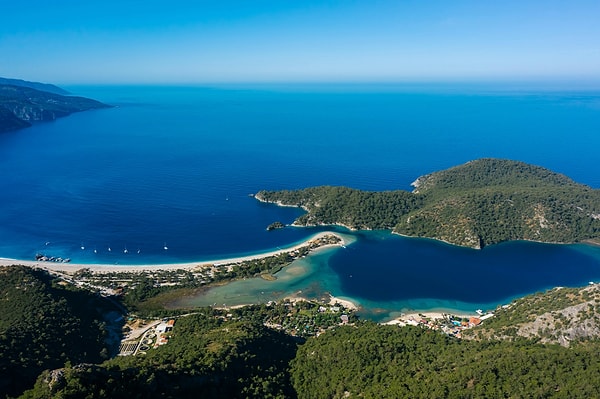
One of the most famous bays in Turkey and the world, Ölüdeniz attracts attention with its clear turquoise sea, calm water surface and magnificent view of Babadağ. The Blue Flag-certified Belcekız Beach is perfect for families and water sports enthusiasts. Temperatures average 30–35°C in summer, while sea temperatures range from 24–28°C.
Activities: Paragliding, scuba diving, sea kayaking, paddleboarding, and a summit tour via the Babadağ cable car line.
Transportation: Minibuses run every 20 minutes from the centre of Fethiye. Private transfers and taxis to Ölüdeniz are also available.
Accommodation: A wide range of accommodation options are available, from 5-star hotels to boutique guesthouses, camping sites and glamping options.
Additional Information: In addition to sunbathing areas on the beach, there are also underwater photography courses, beach safety and first aid points.
2. İztuzu Beach (Dalyan – Ortaca, Muğla): A Natural Heritage Site
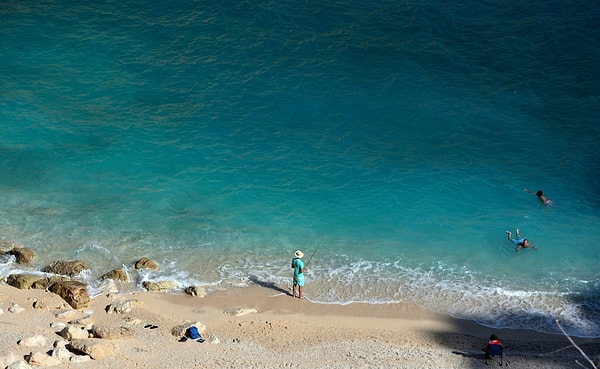
İztuzu Beach is one of the rare ecosystems where fresh and salt water meet. This fine sandy beach, stretching just in front of the reeds, is also known as a conservation and nesting area for Caretta caretta sea turtles. Light and noise restrictions are enforced in the protected areas.
Transportation: It can be reached in approximately 20–30 minutes by minibus from Dalyan or by boat tours along the Dalyan Canal.
Additional Information: While the western side of the beach is preserved in its natural state, the eastern side has showers, changing rooms and toilets.
Visitor Note: Guided tours are recommended for turtle watching experiences at sunset. Additionally, the İztuzu Turtle Rehabilitation Centre (DEKAMER) in the area is open to visitors.
3. Kaputaş Beach (Kaş – Kalkan, Antalya): Postcard-perfect scenery
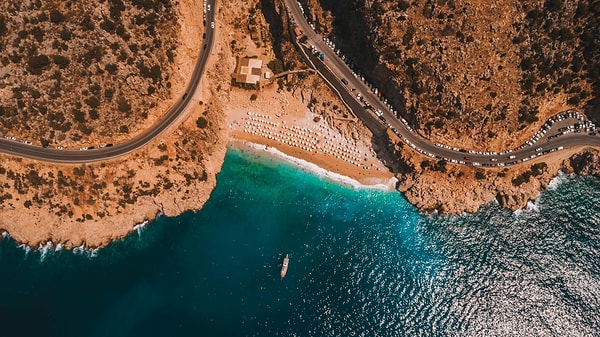
With its turquoise waters and rugged cliffs, Kaputaş Beach is one of the most iconic spots on the Mediterranean. To reach the beach, you must descend 187 steps, which offers a unique opportunity to enjoy the scenery.
Features: The beach, which has Blue Flag status, is in direct contact with the open sea and wave activity is sometimes high. This makes it attractive for drifting and water sports.
Food and Drink: There are a limited number of snack bars and cafes on the beach. There are rich gastronomic options in Kalkan and Kaş centres.
Extra Note: The environmental measures taken to prevent coastal erosion at Kaputaş Beach serve as an example of sustainable tourism without harming nature.
4. Cleopatra Beach (Sedir Island, Marmaris – Muğla): The Legend of Golden Sands

This beach, where Cleopatra is believed to have swum with Antony, attracts attention with its legendary golden sand. The sand has a rare mineral structure believed to have been brought specially from Egypt, and its removal is strictly prohibited.
Access: The island can be reached in approximately 30–45 minutes by daily boat tours departing from Akyaka or Marmaris.
Activities: Snorkelling, nature walks, and exploring the ruins of the ancient city of Sedir Island are available.
Information: Camping is prohibited on the island; a day trip is recommended. Other nearby stops include İncekum and Boncuk Bay, which are also included in the boat routes.
5. Butterfly Valley (Fethiye, Muğla): Isolation in Harmony with Nature
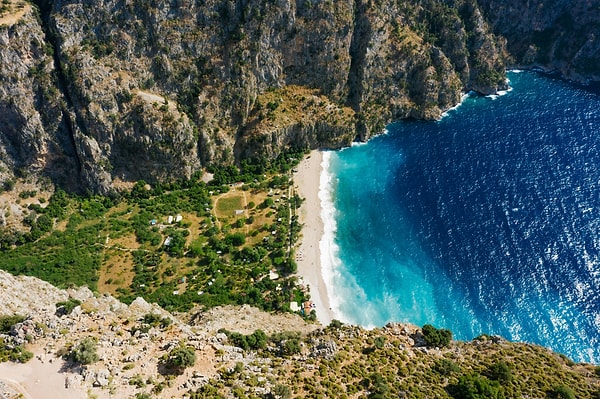
Butterfly Valley, accessible only by boat from Fethiye, is a unique natural wonder surrounded by steep cliffs 350 metres high. It takes its name from the more than 80 species of butterflies that live in the area. The valley is completely isolated, with no concrete structures, noise or light pollution.
Transportation: It can be reached by boat from Fethiye in the morning and evening, with the journey taking 30–40 minutes. The fare is between 1000 and 550 TL per person.
Accommodation: Electricity is provided by solar panels. There are camping areas, bungalows and tents available for rent. There are no hotels or guesthouses.
Activities: Valley trekking routes, waterfall walks, butterfly watching, yoga camps and overnight camping.
Additional Information: Overnight guests are expected to be mindful of environmental cleanliness. Visitors are required to take their rubbish with them.
6. Patara Beach (Antalya – Kaş): The Legendary Beach Where History Meets Nature
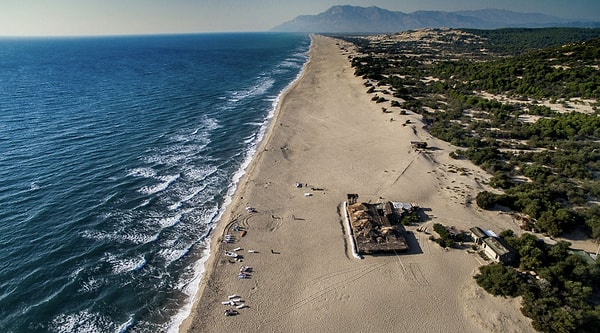
With a length of 12 kilometres, Patara Beach is one of the longest and cleanest beaches in Turkey and Europe. It is also home to one of the most important ancient cities of the Lycian Civilisation. Patara, which is on the UNESCO World Heritage Tentative List, is a beach that has retained its natural beauty and is not allowed to be urbanised.
Transportation: Access by private vehicle is possible from Kaş and Kalkan. The distance between Kalkan and Patara is approximately 20 kilometres. Minibus services are limited.
Entrance Fee: Entry costs around 10 Euros. Sunbed and umbrella rental costs 600-700 TL.
Protected Area: It is protected as a nesting area for loggerhead sea turtles. Access to the beach is prohibited at night.
Activities: Watching the sunset, visiting the ancient city of Patara, nature walks on the sand dunes, and photography.
Additional Information: Patara is also historically significant as the site where Turkey's first parliament was established.
7. Çıralı Beach (Antalya – Olimpos): Silence, Nature and Ancient Ruins
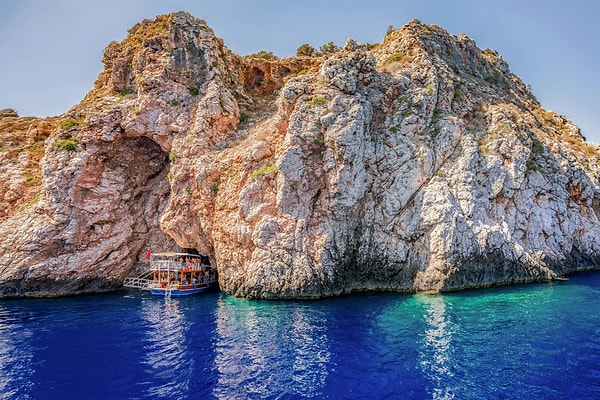
Çıralı, located in the Kemer district of Antalya, stands out with its nature-friendly and sustainable tourism model, unlike noisy holiday resorts. Its proximity to the ancient city of Olimpos and natural phenomena such as Yanartaş (Chimaera) makes it ideal for both history and nature lovers.
Entrance: The Beach entrance is free. Sunbed and umbrella rental averages 400-500 TL
Transportation: Approximately 1–1.5 hours by car or minibus from Kemer.
Accommodation: There are no multi-storey hotels in the area. Small guesthouses, eco-friendly bungalows, family-run establishments and camping areas are available.
Activities: Night walk to Yanartaş, tour of the ancient city of Olympos, boat tours, cycling routes, and caretta turtle watching.
Additional Information: Çıralı is one of Turkey's ‘eco-tourism model villages’.
8. Suluada (Adrasan, Antalya): Turkey's Maldives
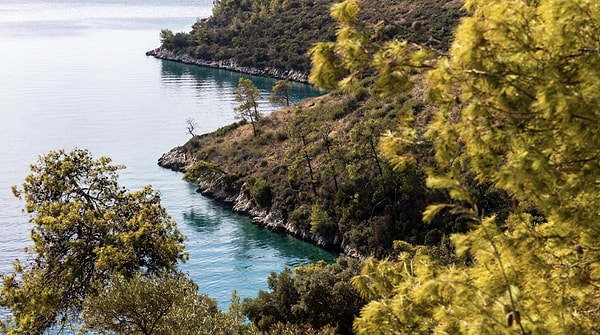
Famous for its white sandy beaches and crystal-clear turquoise waters, Suluada is an excellent choice for those looking for a day trip to escape to nature along the Antalya coast. Construction, camping, and overnight stays are strictly prohibited on the island. It is a completely nature-based destination.
Transportation: The island can be reached by boat tours departing from Adrasan Beach, with a journey time of 40–45 minutes. Round-trip fares range from 800 TL for adults and 550 TL for kids.
Facilities: There is no electricity, drinking water, café, or accommodation on the island. All needs must be met on the boat.
Activities: Snorkelling, diving among coral reefs, cave exploration, underwater photography.
Additional Information: The water sources on Suluada gave the island its name, and boats sometimes take water from these sources. The water quality is very high.
9. Ovabükü & Palamutbükü (Datça, Muğla): Datça's Clear Treasures

Ovabükü and Palamutbükü, among the calmest and clearest beaches on the Datça Peninsula, are popular destinations for nature-loving holidaymakers with their crystal-clear, pebble-free waters. They are ideal for a quiet, simple, natural seaside holiday.
Transportation: Approximately a 30–45-minute drive from Datça centre. Minibus services are limited during the summer months.
Facilities: The beaches feature small family-run businesses, cafes, and a few boutique guesthouses. Sunbed rentals cost around 500 TL.
Accommodation: Palamutbükü offers stone house guesthouses, while Ovabükü features camping areas and small apartments nestled in nature.
Activities: Diving, sea kayaking, morning swims, and evening meals at seafood restaurants.
Additional Information: The local community is also known for its olive oil, almond, and honey production; visitors can purchase these products directly from the producers.
General Considerations - Turkey in July:

Crowd: July is a popular time for both domestic and international tourists. Popular beaches may be busy, and traffic may increase; therefore, early arrival and reservations are essential.
Heat & UV: Daytime temperatures 30-35 °C; sunscreen, hats and water are a must.
Prices: Umbrellas and sunbeds ~500-700 TL/day; boat tours 1000-1500 TL per person.
Conservation rules: Caretta, rare nature areas (Butterfly Valley, Sedir Island) night entry bans; protection limits should be observed.
Activities: Diving, paragliding, boat tours, trekking, excursions to historical ancient cities; each beach has a different experience.
Keşfet ile ziyaret ettiğin tüm kategorileri tek akışta gör!

Send Comment